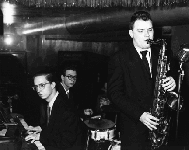Academic by Day, Jazz Pianist by Night: American Sociologist Howard Becker
Howard Becker is best known as an American academic researching and writing about the sociology of deviance, and subsequently art and music. The two books of his that I am most familiar with are Outsiders (1963) and Art Worlds (1982), and it was only recently that I became conscious of his writings on Jazz. His connection to the jazz world placed him in an ideal position to study drug abuse among be-bop musicians, which provided the foundation for Outsiders - a study of pot smokers from which labelling-theory emerged. Art Worlds looked into the cultural context from which a work of art emerges: consisting of a network of people ranging from the artist through to suppliers of materials, distributors, critics and audiences.
It is said that Becker thought of music as his career and sociology as his hobby. Whether or not this is true it is clear that the processes and practices that Becker observed (e.g. repertoire) in music performances were also present in people's common activities including contexts of work - hunting, gathering, agriculture, manufacturing, craft etc. His writing on jazz talks of the 'collective' process which is analyzed sociologically in terms of 'doing things together'. Do You Know... The Jazz Repertoire in Action (2009) written in collaboration with fellow musician Robert Faulkner, details how jazz musicians play music together through a process of negotiation which includes the musicians, the audience and the person paying the bill.
Becker on piano at the 504 Club
Howie, as Becker likes to be called, was fifteen when he started to work as a jazz pianist during the World War II when most piano players over eighteen had been drafted to assist the war effort. As a young man he played jazz piano for a living in bars and strip clubs across Chicago until he drifted in to sociology. The article The Etiquette of Improvisation is based on on a study of the informal 'rules' that govern the performance. For Howie improvising is not unique to playing music it is in fact the way ordinary social life goes on. There is an element of people-do-what-it-takes-to-get-the-job-done, and it's just an ordinary part of everyday life, and because most musicians need to work, they play what needs to be play. Jazz Places makes an interesting point that music played by a jazz group can bear the traces of the less than pure music they played on some other occasion - from strip joint to church. 'Place' becomes very important in determining repertoire according to what physical space, social and financial arrangements made possible.
Howie Becker's website: http://home.earthlink.net/~hsbecker/

